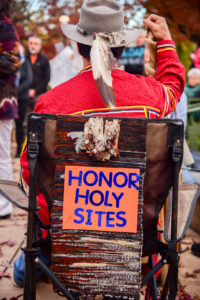
Dar Khabbaz, a Cherokee ceremonial leader, sits in a chair at the silent rally and protests against the Dakota Access Pipeline and Wells Fargo Bank on Nov. 15 at the flag pole on the front lawn. (Ashley Omoma/B&W Staff)
More than 250 people gathered at the UC flagpole Nov. 15 to represent the Lehigh Valley in a nation-wide Day of Action against the controversial Dakota Access Pipeline. More than 200 demonstrations across the country were scheduled for Nov. 15 through the Action Network.
The Green Action Club and residents of the Eco House joined members of the Black Student Union, who also had a Black Lives Matter demonstration scheduled for the same night.
“There’s a lot of intersectionality between these two issues,” said Andrew Goldman, ’19, the action chairperson of the Green Action Club. “There’s police brutality, there’s disregard for human rights, there’s disregard for people’s property, and so it was a really great way to bring together multiple causes that are all calling for the same basic form of human rights and social justice.”
The Silver Creek Singers started the event as protesters gathered at 4 p.m. The band played a ceremonial prayer song before several Lehigh students, faculty and staff gave speeches about the importance of the demonstrations.
According to the company’s website, the Dakota Access Pipeline is 1,172 miles long and will transport approximately 470,000 barrels of crude oil per day from the Bakken and Three Forks production areas in North Dakota to Patoka, Illinois.
This pipeline became the center of controversy when the Standing Rock Sioux Tribe in North Dakota sued the U.S. Army Corps of Engineers, which approved the project. The lawsuit stated, “the Tribe and its members have been, are being, and unless the relief sought herein is granted, harmed by the Corps’ failure to comply with environmental and historic preservation laws.”
Their reasons for this harm include the fact that the pipeline crosses lands and waters of historical, cultural, spiritual, ecological and economic significance.
“The extraction industry is basically affecting tribal identity, the environment, the cultural continuity of the people, as well as the health risks that are yet to be revealed from this,” graduate student Jacqline Wolf Tice said.
Wolf Tice, who spoke at the demonstration, has been conducting research on the socio-ecological effects of extraction industry practices on the Dakota’s Mandan Hidatsa Arikara Nation. She said these negative effects are a direct result of the United States government disregarding the trusting relationship it is meant to have with the sovereign tribes.
After the speeches, protesters marched to the South Side branch of Wells Fargo. Goldman said Wells Fargo is a large contributor to the construction of the Dakota Access Pipeline, because they have pledged about half a billion dollars toward its construction. Goldman then gave a speech calling for the company’s divestment from the fossil fuel industry.
“It was kind of a symbolic gesture, but also a call to action on their part and everyone else who is a member of an institution that has investments in these destructive infrastructures,” Goldman said. “It’s our responsibility to call on them to divest.”
The group returned to campus for a speak out after their march to Wells Fargo. Members from both the anti-DAPL and Black Student Union groups had the chance to speak. Some read from prose and others read their own speeches or poems.
“The reason that we say Black Lives Matter is because it’s been historically shown time and time again that black lives do not matter,” Bruke Mammo, ’17, said. “There are not that many people who have received that kind of treatment. Latino and Latina people have received that kind of treatment. Native people are receiving that same treatment right now.”
Wolf Tice said as of Nov. 14, the Army Corps of Engineers has delayed the continuation of the DAPL construction until it conducts further environmental and cultural review with the Standing Rock Sioux Tribe. They supported the public’s right to peacefully speak freely about the issue, with the Day of Action coming in time to take advantage of that right.
Goldman said it is possible to stop pipelines, as evidenced with the rejected Keystone XL Pipeline. He said these protests against the DAPL serve as the first step in a long fight against its construction.
“It was more than just the pipeline, it was a symbol of everything that’s wrong,” Goldman said. “You have the destruction of the environment, disregard for native people’s rights and general human rights. There’s police brutality involved, armed forces attacking peaceful protesters to protect corporate interest.
“It really is a focus point for so many different activist groups, and I think that coupled with the ability of social media to bring all these people together has really allowed us to make it an incredible movement.”





Comment policy
Comments posted to The Brown and White website are reviewed by a moderator before being approved. Incendiary speech or harassing language, including comments targeted at individuals, may be deemed unacceptable and not published. Spam and other soliciting will also be declined.
The Brown and White also reserves the right to not publish entirely anonymous comments.
1 Comment
Thanks to the event organizers (and to the B&W staff) for providing a venue for Lehigh students, faculty and the surrounding community to activate our collective concerns.